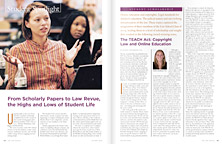Krupa Desai: Woman on a Mission with Help from PILC Grant
Printer Friendly VersionNYU School of Law prides itself on the number of students who choose to pursue public service law, both during the summers between terms, and after graduation. Many faculty members and students believe strongly in the potential for public interest advocacy to achieve some of the profession’s highest ideals.
 Krupa Desai (’06) is one of them. Those outside the legal world often assume that top law students immediately grab summer slots with high-end law firms. But Desai, like many of her classmates opted to do something different. She headed west to spend the summer doing grass-roots advocacy work for Bet-Tzedek, a nonprofit in Los Angeles.
Krupa Desai (’06) is one of them. Those outside the legal world often assume that top law students immediately grab summer slots with high-end law firms. But Desai, like many of her classmates opted to do something different. She headed west to spend the summer doing grass-roots advocacy work for Bet-Tzedek, a nonprofit in Los Angeles.
“I see law as a tool to affect social justice. I wanted to go to law school before I worked for Teach for America, but that experience really fueled the fire,” she said.
The Law School is well known for its support of public interest advocacy both through its Public Interest Law Center and through the Root-Tilden-Kern Scholarship Program, which funds legal training for prospective public interest lawyers. Support for public interest advocacy at the Law School was further strengthened last year with the introduction of guaranteed Public Interest Law Center funding for any firstor second-year public interest internship. Desai was one of more than 300 Law School students who this year decided to use a grant.
Bet Tzedek is Hebrew for “house of justice.” The organization, which is funded by a broad base of state, corporate, and private contributors, was founded by volunteers 30 years ago as a law clinic providing pro bono legal services to the most vulnerable members of the local community. Since then, it has grown from a one-evening-a-week drop-in center to one of the country’s foremost providers of legal services. There are now more than 30 affiliated centers throughout Los Angeles County catering to more than 10,000 people.
One of the advantages that public sector internships have over those in the private sector is the level of responsibility given to interns. “It’s working out really well,” said Desai. “It’s very practical. I’m dealing with civil legal services and issues related to public benefits, Social Security, and disability benefits. I am currently working on a brief for a client who has been denied Medicare after serious surgery. It’s a great follow-up to our firstyear lawyering course; I can really put what I learned into practice.”
But it’s a tough decision for young lawyers to enter the public interest sector. Recent graduates are faced by a financial double disincentive—soaring post-law school debt combined with the lure of corporate pay packets. The imbalance of resources between public and private firms makes itself felt even before graduation. Second-year interns in corporate law offices can expect to earn upward of $2,500 a week; public interest internships, by contrast, are largely unpaid (except for the Law School’s funding).
The Bet Tzedek internship comes after Desai’s first year at the Law School. She is considering applying for term-time internships to gain as much experience as possible in the two years before she graduates. Although she intends to round out her experience by spending a summer working for a private law firm, eventually Desai plans to return to public practice.
